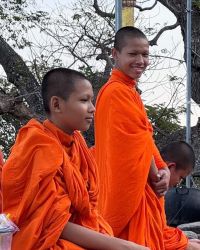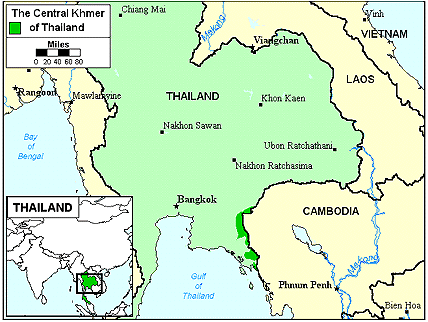The Central Khmer of Thailand are refugees from the war-torn country of Cambodia and Laos. They occupy refugee camps located all along the borders of eastern Thailand and Cambodia. They speak Khmer, or Cambodian, which is an Eastern Mon-Khmer language.
The great Khmer Empire, which flourished between the ninth and thirteenth centuries, encompassed present-day Thailand, Cambodia, Laos, and southern Vietnam. Its power declined when the Thai and Vietnamese conquered the Khmer and restricted them to the area that is now known as Cambodia.
Bombings, civil war, and war with the Vietnamese turned Cambodia into killing fields in 1970. Many Khmer fled to Thailand in hopes of finding a more peaceful climate. Unfortunately, Thailand has had its own problems with governmental changes, military coups, and riots. In the aftermath of the Vietnam War, the thousands of refugees placed an added strain on Thailand's economy.
In 1975, the Khmer Rouge regime nearly destroyed Cambodia. To depopulate the cities, three million people were forced into the countryside to do slave labor. Widespread starvation led to the deaths of over one million people in the name of the ideal of rural social reform. The people either fled north into Thailand, or took the trail of tears into Communist Laos where they did not find the sanctuary they sought. Instead, they struggled to find clothing, shelter, medical resources, and food.
The Khmer who stayed in Thailand live in small villages or refugee camps. There, families are separated from each other and have few personal possessions. The shelters are made with thatch roofs, bamboo walls, and are built on stilts.
More men than women were killed between 1975 and 1979, creating a skewed sex ratio among the Khmer. Today, mostly widows and orphans remain, requiring the women to perform the duties that once belonged to the men. The women dress in colorful skirts, adding life to their unhappy environment. Red and white checkered cloth is used to make everything from headdresses to pouches for carrying babies.
All of the Khmer contribute to work in the villages and grow rice in irrigated plots. Each village has its own chief, and there is no political structure beyond the village. The village chief is the link between the people and the central government.
Village leadership is usually divided; the chief has authority in secular matters, while the Buddhist monk has authority in religious issues. Buddhist rules of conduct are used to maintain social control.
The Khmer have acquired the languages and cultures of their Thai neighbors. Ancient Khmer influences on the Thai are strong as well, giving the two groups a common ancestral bond. Traditional Khmer music reflects a tie to Indonesia. Folk dancing and the classical royal ballet are also popular.
The former Khmer Empire was influenced by India, from which it adopted Hinduism and Buddhism. Today, the majority of the Khmer are Buddhist, although relics of ethnic religions such as ancestor worship (praying to deceased ancestors for guidance) and spirit worship are very important to them.
Due to Buddhist influence, the Khmer also seek the middle path to nirvana, or ultimate peace through gaining merit in this life. Merit may be gained through supporting the construction of new Buddhist temples, giving food to Buddhist monks, and studying in the monastery. Peasant boys often became monks in order to gain an education in the Buddhist monasteries.
The Central Khmer left their original homeland in search of peace. Unfortunately, the peace they desired has not been found in Thailand. They are in need of loving Christians who will introduce them to the Prince of Peace, Jesus Christ.
Ask the Lord to call people who are willing to go to Thailand and share Christ with the Central Khmer.
Pray that God will grant wisdom and favor to the missions agencies that are currently working among the Khmer.
Pray that God will encourage and protect the Khmer who have accepted Jesus.
Ask God to use these new converts to reach out and share the love of Christ with their own people.
Ask God to call forth prayer teams who will begin breaking up the soil through intercession.
Pray that strong local churches will be planted among the Central Khmer by the year 2000.
Scripture Prayers for the Khmer in Thailand.
| Profile Source: Cambodia Research Network. Click to email CRN inquiries and corrections Copyrighted © Used with permission |











